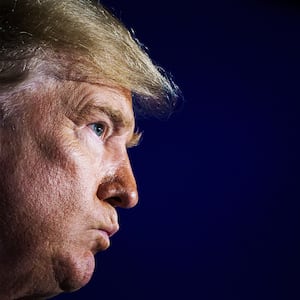The U.S. Department of Energy has approved six authorizations for U.S. companies seeking to conduct nuclear related work in Saudi Arabia, according to two sources with knowledge of those approvals.
Federal law stipulates that companies obtain clearance from the U.S. government for exporting nuclear technology to or engaging in the production or development of special nuclear material in Saudi Arabia.
The authorizations—known as Part 810s, referring to a clause in federal regulations —allow U.S. companies to divulge specific details about plans for working in Saudi Arabia and certain information about the nuclear technology. For example, a company would need a Part 810 to transfer physical documents, electronic media, or the “transfer of knowledge and expertise” to Saudi Arabia, according to the Department of Energy.
It’s been unclear to what extent the U.S. government, and U.S. companies, have communicated with Riyadh about nuclear energy, especially in the wake of the brutal murder of journalist Jamal Khashoggi and amid claims by Democrats on the Hill that individuals in the national security community attempted to discuss a nuclear deal with Riyadh without going through the proper regulatory approval process.
The DOE authorizations, previously unreported, indicate that U.S. companies are indeed moving ahead in their plans to engage with Saudi Arabia on nuclear technology and nuclear energy development. The companies began seeking contact with Riyadh in November 2017.
It’s unclear which U.S. companies have obtained authorizations. The Department of Energy has not responded to a Daily Beast Freedom of Information Act request. However, a congressional source said U.S. companies have the option of requesting their authorizations remain private and do not land in the department’s public reading room. The companies that received the Part 810s under the Trump administration have made such a request, according to that source.
IP3, a firm that includes former generals, diplomats, and energy experts, was mentioned in a recent report by the House Oversight Committee. That report said IP3 had developed a proposal for Saudi Arabia that was “not a business plan” but rather “a scheme for these generals to make some money.” That report said Former National Security Adviser Michael Flynn had ties to the firm during his time working in the Trump administration.
“IP3 was formed as a bipartisan company to support the development of a public-private model for the peaceful introduction of nuclear power by the United States and its allies,” said Mike Hewitt, CEO of IP3. “There are concerns over Russia and China’s expansion into global nuclear power development and the inherent geo-political and national security issues. The Middle East is but one region where this competition is playing out and currently the United States and its industry are not competitive in this growing market.”
IP3 still is in conversations with Saudi Arabia and other countries across the Middle East about nuclear energy related work, a source with direct knowledge of the firm’s plans told The Daily Beast. The firm’s proposals, however, look much different than what’s previously been reported, the source said, adding that they focus on security and protection of nuclear energy infrastructure.
In a hearing with Secretary of State Mike Pompeo Wednesday, Rep. Brad Sherman raised the issues of the part 810 authorizations and asked that Pompeo share those documents with the committee.
“One thing that is in our interest is to prevent Saudi Arabia from getting a nuclear weapon,” Sherman said. "What I’ve seen in this administration recently ... is an effort to evade Congress and to some extent evade your department and provide substantial nuclear technology and aid to Saudi Arabia while [the country] refuses to abide by any of the controls we would like to see regarding reprocessing, enrichment."
Pompeo said the State Department is still looking into the assistance Saudi Arabia could receive from U.S. companies on nuclear development and how to prevent the country from developing nuclear weapons.
The Daily Beast previously reported that as of late last year, members of the State Department were working actively to develop what’s known as a 123 agreement under the Atomic Energy Act.
The deal would provide the overall structure for nuclear cooperation between the U.S. and Saudi Arabia and would help guide the process of American companies exporting their nuclear technology to Riyadh.
The Atomic Energy Act requires legally binding commitments from countries that work with U.S. nuclear technology that they will not use those materials for making nuclear weapons. The law also mandates that the U.S. has to approve any enrichment of uranium involving American technology. The U.S. has over two dozen 123 agreements with countries such as Egypt, the United Arab Emirates, and Canada.
Trump’s son-in-law Jared Kushner met with Saudi Crown Prince Mohammed bin Salman and other members of the Saudi government in Riyadh last month. Sources told The Daily Beast that members of the U.S. embassy in Riyadh were essentially shut out of those conversations, raising concern by Democratic lawmakers that Kushner and MBS had discussed a nuclear deal with minimal oversight.








